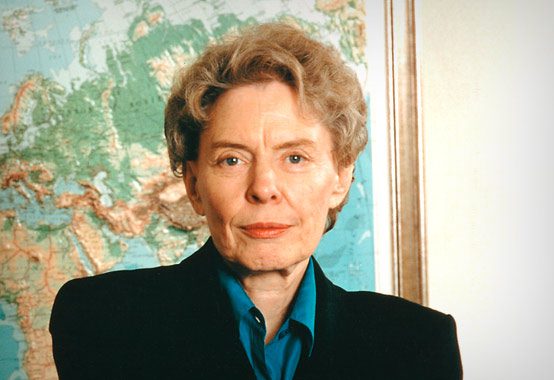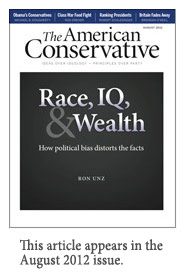Reagan’s Athena

In the summer of 1990 Jeane Kirkpatrick published an essay in the National Interest. It was less than a year after the fall of the Berlin Wall. German reunification loomed in October. The Soviet Union had not yet collapsed. So what was Kirkpatrick’s take on events?
Instead of espousing the triumphalism that characterized much of the neoconservative movement, she adopted a more severe tone. America, she announced, should become a “normal nation,” one that could return to “normal times” now that it had overcome the “messianic creeds”—Bolshevism and Nazism—that had sought to leave their impress upon history, only to expire in the ruins of Berlin, where Hitler had staged his personal Götterdämmerung, and the forbidding mountains of Afghanistan, where the Mujahideen besieged the once mighty Red Army.
This was not a credo that many of her close colleagues chose to embrace. Rather, they sought a new mission.
Paul Wolfowitz suggested in a controversial 1992 document leaked to the New York Times that America should more or less announce “I am the Greatest!” to ensure that it established hegemony over any possible comers such as Germany or Japan, then seen as potential competitors. It was, moreover, time to shake up the Middle East, to rid it of tyranny and, along the way, to export the American way to every nook and cranny of the globe.
Charles Krauthammer, writing in Foreign Affairs, thus announced that what he deemed “The Unipolar Moment” had arrived—“communism may be dead but the work of democracy is never done.” He paid homage to Kirkpatrick’s efforts, but stated that “international stability is never a given,” rather it is the result of “self-conscious action by the great powers and most particularly by the greatest power.”
Kirkpatrick was unconvinced. She viewed the second Iraq War with profound misgivings, though she was cautious about publicly airing her doubts.
After the Cold War ended, Kirkpatrick’s star power waned at her old redoubt, the American Enterprise Institute. Her final book on foreign affairs was rejected by AEI’s press. One day she simply packed up her office and left. Another former UN ambassador, John Bolton, occupied it. In December 2006, on the eve of the publication by HarperCollins of her book Making War To Keep Peace, she died.
In his elegiac biography Political Woman, Peter Collier assesses Kirkpatrick’s life and legacy. Collier, a graceful writer, has produced a study that makes for at times painful but always illuminating reading. He covers everything from her tumultuous family life to her unexpected emergence as a conservative celebrity during the first term of the Reagan administration. Kirkpatrick was the first woman to occupy a prominent place in what had been the old boy’s network of the foreign-policy establishment, which often viewed her with scorn. As someone who knew and enjoyed talking with Kirkpatrick, I am struck by how deftly Collier has captured her intellectually intense, knotty, and willful personality.
As he emphasizes, Kirkpatrick’s outsized personality was formed in Duncan, Oklahoma and Vandalia, Illinois. Her father, whose nickname was “Fat,” had a prickly side that she inherited. Proud of his daughter but reluctant to see her stray too far from home, he stopped her from applying to the University of Chicago and compromised on Stephens College, a two-year school for women in Columbia, Missouri.
Later, after earning a B.A. at Barnard, Kirkpatrick entered graduate school in political science at Columbia University, where she signed up for a four-semester course on German politics taught by Franz Neumann, a refugee from totalitarian Germany and the author of a massive study of the Nazi bureaucracy, Behemoth.
According to Collier, this sage taught how “extremists of the right and the left, Nazis and Communists, had collaborated to cause the violent collapse of Weimar as supporters of the Republic stood by impotently appeasing them. This became one of the foundational lessons of Jeane’s life.”
Neumann also introduced Kirkpatrick to Hannah Arendt and had her study files about the inner workings of the Nazi regime, acquainting her further with the meaning of totalitarianism. Under his guidance, she wrote a master’s thesis on Oswald Moseley’s British Union of Fascists.
But her father rebelled at supporting her financially. He wanted his daughter back. Rather than return home, she landed a job at the State Department working for a man named Evron “Kirk” Kirkpatrick, who headed the Office of Intelligence Research. Collier reports, “she had found the Pygmalion who would intellectually sculpt her in a way that brought her fully to life.”
Evron was already 40 when he hired Jeane and was something of a pooh-bah in political science. A close friend of Hubert Humphrey, who had studied with him in Minnesota, Evron Kirkpatrick was an agile academic and political operative. As Collier puts it, “as the postwar world took place, Kirk became the inside player par excellence—with fingers in the intelligence world, Democratic party politics, political science, and in the State Department’s efforts to bring scholars and research organizations into its new psychological warfare program.”
Jeane, who married Evron in 1955, received the final buffing of her Cold War bona fides from him.
As Collier properly notes, both Kirkpatricks were staunch Democrats and anti-communists—this was no contradiction in terms until the Vietnam War. Prodded by her husband, Jeane contributed political essays as she earned her Ph.D. at Columbia, where she became an expert on Latin America, and thereafter landed a job in the government department at Georgetown University.
So far, so good. Kirkpatrick was on her way to a respectable but not stellar career. It was her disenchantment with Jimmy Carter and George McGovern that prompted her to write “Dictatorships and Double Standards,” an excoriation of the Carter administration published in Commentary in 1979 that catapulted her to fame. The essay, which caught the eye of presidential candidate Ronald Reagan, contended that authoritarian regimes were more likely to mellow than totalitarian ones. It also suggested that the Carter administration had been entirely precipitous in supporting the overthrow of anti-communist regimes in Iran and Nicaragua that were friendly to America and its interests. Nor was this all. She poured cold water on the notion that democracies could be created overnight.
The Carter administration might propound the importance of standing up for human rights abroad, but the fact was that inculcating the habits of a successful democracy “takes decades, if not centuries.” (The very charge, incidentally, that opponents of the second Iraq War would hurl at George W. Bush.)
As Reagan’s United Nations ambassador Kirkpatrick pasted the Soviets and the Arab states for their anti-Semitism and for denying fundamental freedoms. But how firm a basis for international affairs her distinction between authoritarian and totalitarian regimes provided is questionable. The distinction is real but not necessarily dispositive in judging the capacity of a nation for internal reform or even revolution. Kirkpatrick could never quite dodge the suspicion that she had concocted a fig leaf for overlooking the abuses of Central American regimes that were seen as pro-American and anti-communist.
Consider Argentina. Kirkpatrick got into considerable hot water over her attempts to reach an accommodation between the Argentines and the British in the Falklands dispute. But it was Margaret Thatcher who was operating in the Churchillian vein, much to Kirkpatrick’s amazement, by sending ships to put paid to the pretensions of the odious General Leopoldo Galtieri and his camarilla. Was Kirkpatrick, who was trying to outmaneuver Secretary of State Alexander Haig, out of her depth? Surely Thatcher did as much as anyone to show that the West was no longer the supine 99-pound weakling of the 1970s and was ready to take the fight back to its enemies.
In retrospect, it is also hard to share Kirkpatrick’s fervor for what was known as the Reagan Doctrine—the idea that America had to support the Contras at all costs. The truth is that the Soviet Union was already in the 1980s a fading enterprise, not one that warranted the sort of fire-bell-in-the-night alarms that Kirkpatrick and Co. were wont to sound about its intentions.
Kirkpatrick ended up being boxed out by more pragmatic colleagues in the administration such as George Shultz and James Baker. She received no cabinet-level appointment in the second term. Instead, Reagan followed a more emollient approach toward the Kremlin, which was only too happy to reciprocate. Whether Reagan himself was the Cold War figure of legend may also be questioned—his detestation of nuclear war and readiness to abandon the U.S. nuclear force at Reykjavik suggest that he was not as hawkish as his liberal detractors depicted.
While her political influence was never as significant, Kirkpatrick had become one of the most popular figures in the Reagan administration. Like Daniel Patrick Moynihan, she embraced a form of intellectual populism. She used the UN as a pulpit to assert the moral superiority of America over its adversaries. She also went on the offensive on the home front, most notably in her 1984 address to the Republican convention, where she denounced the “blame America first” Democrats who had assembled in San Francisco.
Yet she never entirely cottoned to the Republican Party. She was a foreign-policy neoconservative, as that term was understood in the 1980s, but she remained close in spirit to Hubert Humphrey and the old-time credo of the Democratic Party that had deliquesced into anti-Americanism during the Vietnam War. When I last saw Kirkpatrick at AEI, she seemed almost to tear up as she recalled Humphrey. Later she sent me an essay explaining why she had remained a Democrat in the 1970s. Perhaps it would be fair to say that her heart remained with the Democrats but she could no longer reconcile the party’s beliefs with her intellectual ones.
By the end, however, she had little in common with the GOP and the younger neoconservative generation, both of which had embraced a crusading doctrine that she viewed with discomfort and distrust. When Robert Kagan published an article in Commentary called “Democracies and Double Standards” that repudiated her views—“We could and should be holding authoritarian regimes in the Middle East to higher standards of democracy, and encouraging democratic voices within those societies, even if it means risking some instability in some places,” he wrote—she went ballistic, spluttering to me that she was astounded that the editors would publish it.
 She was temperamentally conservative, a predisposition, Collier indicates, that was rooted in her Midwestern heritage. Quiet confidence and self-restraint were what she admired in men such as Ronald Reagan, not the preening braggadocio of a George W. Bush.
She was temperamentally conservative, a predisposition, Collier indicates, that was rooted in her Midwestern heritage. Quiet confidence and self-restraint were what she admired in men such as Ronald Reagan, not the preening braggadocio of a George W. Bush.
Collier’s examination of her life is probably one that she would not have entirely enjoyed. Collier observes, “I came to see that at a certain level the unexamined life was not only worth living for Jeane, but a necessity. She obsessively covered her tracks even though … they didn’t lead back to any very dark places.” The public obscurity that enveloped her in her final years, however, was not something that the old girl welcomed. Perhaps Collier’s fine study will spark fresh interest in her remarkable career.
Jacob Heilbrunn is a senior editor at The National Interest.
Comments